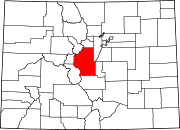Lourette, Colorado
History

The area was first inhabited by Non-Native Americans in 1859 during the Pikes Peak Gold Rush, when gold was discovered along Buckskin Creek, on the east side of the Mosquito Range. At the time of its first settlement, the town was in the western part of Kansas Territory.
The town was formally organized in September 1860 and named Laurette, a contraction of the first names of the only two women in the camp, the sisters Laura and Jeanette Dodge. But it was always more popularly known as Buckskin Joe, after Joseph Higginbottom, an early trapper and prospector. Little is known for certain about Higginbottom. Some accounts refer to him as an African-American; some accounts say that he was the one who first discovered gold in the vicinity of the town.
Mining shifted to rich hardrock deposits in the Phillips lode and other veins. By 1861, when the Laurette/Buckskin Joe Post Office opened, in the newly formed Colorado Territory, the town boasted two hotels, fourteen stores, and a bank. On January 7, 1862 the county seat of Park County moved to Buckskin Joe from Tarryall, now also a ghost town. At its peak, the town was credited with a population of 5,000, but historian Robert L. Brown considers this number far too large.

The placer and vein gold deposits were rich, but were quickly exhausted. By 1866, the town was reported to be deserted, and the courthouse building was moved down the valley to the new county seat of Fairplay. In the late 1950s, Horace Tabor's general store was dismantled, hauled away, and reassembled at the tourist attraction and movie set also called Buckskin Joe, 70 miles (110 km) away from the original site. It remained there until 2011 when it, along with the entire tourist attraction and movie set, was sold to a private collector and moved to a private ranch in western Colorado.
Geography
Buckskin Joe is located about 2 miles (3 km) west of Alma, Colorado at 39°17′35″N 106°05′17″W / 39.2931°N 106.0881°W at an elevation of 10,761 feet (3,280 m).
Notable residents
- John Lewis Dyer, Methodist circuit rider missionary, also arrived in Buckskin Joe in 1861, having migrated from Minnesota.
- Frank H. Mayer, former U.S. marshal in Buckskin Joe, former buffalo hunter
- "Silverheels" (proper name unknown) was a popular dance hall girl at Buckskin Joe and the subject of many apocryphal stories. Mount Silverheels is named in her honor.
- Horace Tabor, later a mining millionaire and U.S. senator, arrived in Buckskin Joe in 1861 and ran a store with his first wife.
See also
- Bibliography of Colorado
- Geography of Colorado
- History of Colorado
- Index of Colorado-related articles
- List of Colorado-related lists
- Outline of Colorado
References
- ^ Bauer, William H.; Ozment, James L.; Willard, John H. (1990). Colorado Post Offices 1859–1989. Golden, Colorado: Colorado Railroad Historical Foundation. ISBN 0-918654-42-4.
- ^ "From the silver mines," Daily Rocky Mountain News, 18 Sept. 1860, p. 2.
- ^ Muiriel Sibell Wolle, "From 'Sailors' Diggings' to 'Miners' Delight," Western Folklore, 1954, v.18, p.44.
- ^ Park County Local History Archives: Hiking through history Archived July 24, 2008, at the Wayback Machine Retrieved November 29, 2008.
- ^ Robert L. Brown (1968). Ghost Towns of the Colorado Rockies. Caxton Press. p. 69. Retrieved November 30, 2008.
ghost towns of the colorado rockies.
- ^ Wineke, Andrew (August 29, 2011). "Mystery buyer for Buckskin Joe revealed to be billionaire Koch brother". The Gazette. Colorado Springs, Colorado. Retrieved July 6, 2020.
- ^ "Geographic Names Information System". United States Geological Survey, United States Department of the Interior. Retrieved September 12, 2023.
- ^ "Biography of Famous Preacher Father Dyer Part 1". trivia-library.com. Retrieved January 19, 2014.
- ^ Laura King Van Dusen, "Colonel Frank Mayer: Buffalo Hunter, Civil War Drummer Boy, Author, Met Dancehall Entertainer Silverheels When U.S. Marshal of Buckskin", Historic Tales from Park County: Parked in the Past (Charleston, South Carolina: The History Press, 2013), ISBN 978-1-62619-161-7, pp. 53-58.
- ^ Robert L. Brown (1968). Ghost Towns of the Colorado Rockies. Caxton Press. pp. 71–73. Retrieved November 29, 2008.
ghost towns of the colorado rockies.
